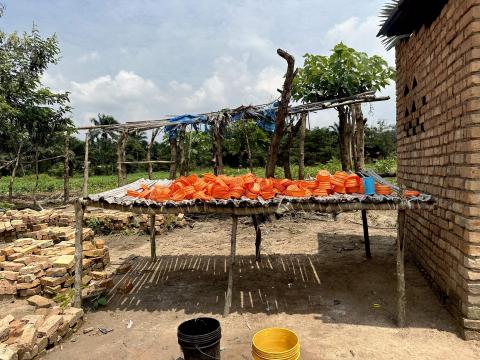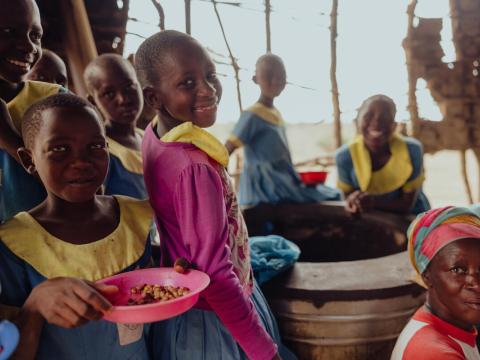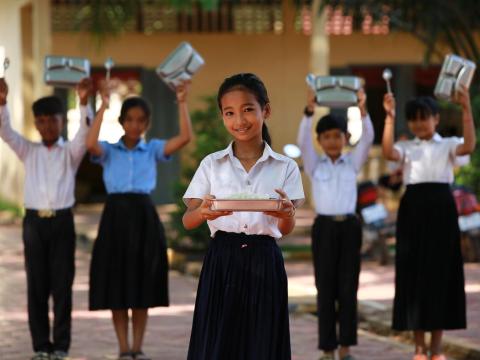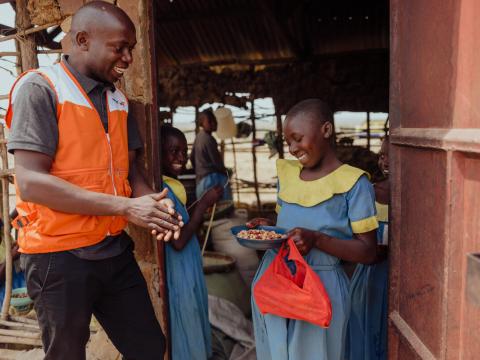
Lessons in Resilience: Insights from School Feeding in Burundi
World Vision's Lora Boll, a Mickey Leland International Hunger Fellow, is experiencing Burundi's School Meal Programme for the first time, sharing the innovations and impact on children.

A few weeks ago, I stepped out of a World Vision Land Cruiser onto the grounds of a school in rural Makamba Province, where World Vision Burundi implements a school feeding programme. Onion, bean, and eggplant sprouts poked from plots of loose soil in the school courtyard, and rainwater collection tanks presided over the corners of each building.
The eager faces of primary school children peered through foggy glass from inside the classrooms or peeped around the edges of doorways. In a corner of the courtyard, preschoolers sat cross-legged on mats, dipping maize bread into orange bowls of stewed vegetables, and parents tended boiling pots of beans balanced on a brick stove nearby.
In Burundi, food insecurity and malnutrition threaten children’s growth and development, school performance, and later economic participation. Skyrocketing inflation, changing climate conditions, and shortages of arable land continue to undermine the agricultural sector, which supports 90% of Burundi’s population. According to recent data from UNICEF and WHO, 56.5% of children under 5 years of age in Burundi experience stunting—the highest rate of chronic child malnutrition in the world—and 18% of households in Burundi consume only one meal per day. Pursuing education also remains a challenge for many children in Burundi. The bright-eyed preschoolers munching on maize bread at the school in Makamba represent a few of the 3.2 million children currently attending school in Burundi—out of 5.1 million total school-aged children in the country. As these numbers suggest, 40% of Burundian children miss out on the benefits of education, due either to dropouts or not enrolling in the first place.
Talking with school directors and parents involved in the oversight of school meals programmes in Makamba Province revealed just what an opportunity school feeding offers for combatting malnutrition, promoting educational attainment, and strengthening local food systems in Burundi. School feeding programmes guarantee children a hot, nutritious meal every day, support learning and healthy development, and encourage school enrollment and attendance. The innovative Homegrown School Feeding model, pioneered by the World Food Programme (WFP) and implemented by World Vision across the globe, also strengthens food systems, promotes environmental sustainability, and reinvests programme resources in local agriculture.

Burundi provides an exciting example of school feeding success, with over 660,000 children currently benefiting from school meals and ambitious government strategies in place to expand this number to 2.8 million by 2032. In partnership with WFP, World Vision provides school meals for over 150,000 children daily at 159 schools in Makamba and Muyinga Provinces. It supports communities by establishing school gardens, constructing kitchens and refectories, and improving hygiene practices. Each of the nine school directors we spoke to during the visit to Makamba reported decreased dropout rates among primary school children compared to previous years before school meals, and multiple principals highlighted overall improvements in exam scores since the advent of the programme. With full stomachs, children engaged more actively in class and stayed after school to participate in clubs and study sessions.
School meals are an effective strategy for reducing malnutrition and improving educational outcomes in diverse contexts worldwide. The school meals approach in Burundi exhibits characteristics that are exceptionally vital for success and provides insights for expanding the impact of school feeding programmes beyond the school grounds.

The first is the wholehearted buy-in and leadership of Burundi’s government. While the World Food Programme serves as the principal donor for school feeding programmes in the country, and organisations such as World Vision implement the activities on the ground, the goal of the government’s approach and strategic partnerships is full ownership and operation of the programmes in the future. World Vision works closely with local authorities and the directors of education at multiple levels of government to ensure effective collaboration and capacity building for future programme appropriation.
Strong partnerships are another cornerstone of school meals implementation in Burundi and encompass a range of stakeholders, including WFP, the government, World Vision, other NGOs, local communities, and school administrators. Each of these stakeholders plays a role in the choice of programme priorities, the types and quality of food available to children, maintenance of on-site activities, community engagement and involvement in activities, and programme outcomes

In addition, local ownership ensures school feeding activities are contextualised to the needs and priorities of each community and school. While WFP and World Vision provide material and technical support for school meals, parents, teachers, and school administrators oversee daily meal preparation, facilitate hygiene and environment clubs, and maintain the school gardens— introducing innovations and initiatives. Environment clubs organised by teachers and students at two schools planted 6500 trees in the surrounding areas to combat climate change. Parents in another location purchased a piglet to provide organic fertiliser for the school garden. The agility of the school feeding programmes allows communities to take the lead in shaping activities to match their interests, needs, and capacities.
In addition, Homegrown School Feeding is increasingly the foundation for school meals in Burundi and expands the reach of the programmes from emergency assistance to long-term development. Twenty-four of the schools World Vision partners employ the Homegrown School Feeding model and receive food commodities for school meals exclusively from local farmer cooperatives. World Vision supports these cooperatives with technical assistance, agricultural inputs, and capacity building to promote agricultural production and strengthen food security in the broader community. By investing in local food systems, Homegrown School Feeding programmes positively impact the nutrition, food security, livelihoods, economies, and environmental sustainability of surrounding areas, contributing to community resilience.

Each context brings unique challenges and opportunities for school feeding. Wading through a patch of amaranth at a school in Makamba, however, I was struck by the overall simplicity, adaptability, and holism of school meals as an intervention, especially the Homegrown School Feeding model. The thriving gardens, fresh-laid brick, steaming maize bread, and avocado saplings visible on school grounds in Burundi reveal possibilities for school meal programmes in other places. Burundi’s school meals programmes offer an example of success and point to approaches practical for strengthening nutrition, education, local food systems, and community resilience through school feeding.
Lora Boll is World Vision's Mickey Leland International Hunger Fellow, World Vision Burundi. Learn more about the Mickey Leland International Hunger Fellow Programme and World Vision's work in School Meals.
 World Vision is a partner of the School Meals Coalition, an initiative of governments and a wide range of partners to drive actions that can urgently re-establish, improve and scale up food and education systems, support pandemic recovery and drive steps to achieve the Sustainable Development Goals (SDGs). Learn more on how to get involved and take action.
World Vision is a partner of the School Meals Coalition, an initiative of governments and a wide range of partners to drive actions that can urgently re-establish, improve and scale up food and education systems, support pandemic recovery and drive steps to achieve the Sustainable Development Goals (SDGs). Learn more on how to get involved and take action.


